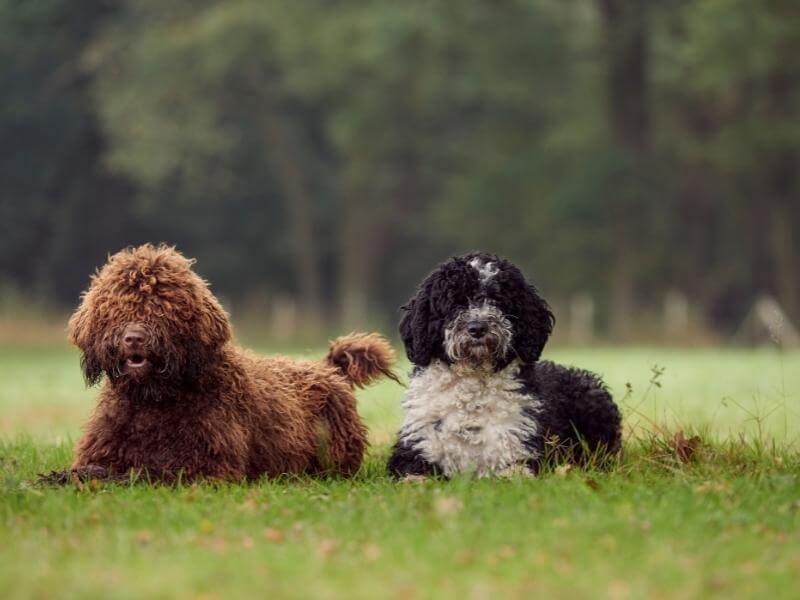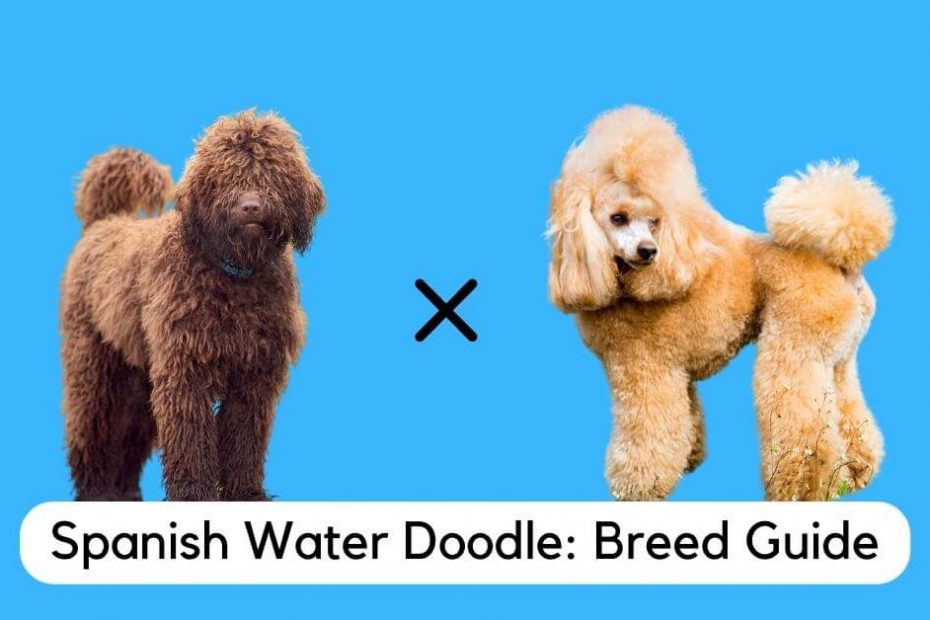Have you ever heard of a Spanish Water Doodle? This amazing mixed breed is extremely uncommon. The Spanish Water Dog-Poodle mix has a mellow temperament and a hard-working nature. It might just be your next pup!
In this guide, I will tell you all about this rare Doodle breed. By the end, you will be able to decide if it’s a good fit for you!
What is a Spanish Water Doodle?
The Spanish Water Doodle is a Spanish Water Dog-Poodle mix. It is a medium-sized Doodle dog breed. It is athletic, smart, and loving. It can also be referred to as a Spanish Water Poo.
History
No one is certain how the Spanish Water Doodle came to be. There are no records that document its history or the motivation for crossing a Spanish Water Dog with a Poodle.
As with many mixes, the first Spanish Water Dog-Poodle mix could have happened by accident.
Luckily, both parent breeds have a rich history. Let’s first take a look at the Spanish Water Dog.
Spanish Water Dog

The Spanish Water Dog has been around for a long, long time. It is considered an ancient breed.
It is a busy dog breed that has held multiple jobs throughout history. It has been used for everything from herding goats and sheep to hunting waterfowl. The Spanish Water Dog was even used to assist fishermen with their catch!
There are a few theories suggesting its origin. The United Kennel Club presents one theory that the Spanish Water Dog’s ancestors originated near North Africa and were brought to the Iberian Peninsula between the 8th and 11th centuries [1]www.ukcdogs.com/spanish-water-dog.
Another theory suggests that these dogs might have come with the various barbarian tribes that invaded Europe after the fall of the Roman Empire [2]www.ukcdogs.com/spanish-water-dog.
The breed has an old nickname “The Turkish Dog” which stems from the idea that the breed was introduced to Spain by Turkish traders [3]www.akc.org/dog-breeds/spanish-water-dog/.
This fun video from a Spanish Water Dog expert provides some really interesting information:
[lyte id=’R_rhMnMrT94′ /]
Modern Day Popularity
This is a lesser-known breed today but it’s gaining more and more popularity each year. In 1985, the Spanish Water Dog was officially recognized and admitted into the Fédération Cynologique Internationale as a “pure breed” [4]www.akc.org/dog-breeds/spanish-water-dog/.
In 2004, it was recognized by the United Kennel Club. It was later assigned to the Herding Dog Group [5]www.akc.org/dog-breeds/spanish-water-dog/.
Poodle
The Standard Poodle originated in Germany nearly 400 years ago. There is debate as to the exact origins of the breed. Some experts claim they descended from ancient Asian dog breeds.
There is even an argument to be made that Poodles descended from the Barbet dog breed in France. The Poodle is France’s national dog but it is widely accepted that its origin story begins in Germany.
Poodles were bred to be waterfowl retrievers, or “duck dogs”. They are excellent swimmers and world-class athletes. As the second smartest dog breed, they are especially easy to train [6]www.rd.com/list/smartest-dog-breeds/.
Modern Day Popularity
According to the AKC, the Poodle is the 5th most popular dog breed in America. The poll does not distinguish if it accounts for all sizes of Poodles.
Appearance of the Spanish Water Doodle
The Spanish Water Doodle is a medium-sized dog and has the potential to be on the larger side. It has the body of an athlete, thanks to both parents.
Their coats are most likely to be curly or wavy. Their ears are triangular and have a droop to them. The Spanish Water Dog-Poodle mix also inherits webbed paws from the parent breeds.
Size
Both Standard Poodles and Spanish Water Dogs can be classified as medium-to-large in size. Females range 15 – 18 inches from the ground to shoulder height [7]www.akc.org/dog-breeds/spanish-water-dog/. Males are expected to measure between 15 – 20 inches at the shoulder [8]www.akc.org/dog-breeds/spanish-water-dog/.
Not too big but not too small. These dogs are slightly longer than they are tall. They’re muscular and have strong, sturdy bones ready to be put to work.
Weight
The average weight for Spanish Water Doodles differs between gender, generation, and overall health.
Females weigh between 30-50 pounds [9]www.akc.org/dog-breeds/spanish-water-dog/. Males weigh in just a bit more at 50-70 pounds [10]www.akc.org/dog-breeds/spanish-water-dog/.
Maybe a little big for a lap dog (or maybe just right!).
Coat Colors
The Spanish Water Dog-Poodle mix has a large variety of colors to choose from when it comes to their coat.
The Spanish Water Dog’s colors vary from solid black or brown to a mix of black, brown, white, & beige. The Poodle has many, many colors. A few common colors are black, chocolate, beige, apricot, silver, blue, red, café au lait, and white.
A Spanish Water Doodle can be one of these colors or it can be a mix. When these colors are mixed, the dog is said to have a “parti-color” coat and can be extremely beautiful. There is also the possibility of a merle coat pattern.
Coat Type
Your Spanish Water Dog-Poodle mix will most likely have thick, curly hair.
Spanish Water Dogs are one of the few breeds that have corded fur, or hair. Their hair is curly and has a wooly texture. Having cords makes life easy in regards to grooming (they don’t shed), but makes life more complicated in regards to the initial cording process.
Luckily, the Spanish Water Doodle will not have a coat that requires cording. Their coat will be curly and fluffy like most other Doodle breeds.
A bonus is that both parent breeds are hypoallergenic [11]www.swdclub.org/breedinformation.html. This means they produce less dander than other dogs, which is a positive for those sensitive to dog allergens.
Traits and Characteristics
The following infographic offers a summary of all the Spanish Water Doodle’s traits and behaviors. The information was gathered for the two parents from the American Kennel Club. It was averaged to create an estimate of where this Doodle breed lies in each category.

Temperament
These dogs are good with children and are very affectionate with those they love. They’re very playful.
They are open to meeting strangers but not immediately best friends with new people. They’re moderately adaptable to new situations. They’re easy to train and are not known to bark a lot.
Energy Level
Spanish Water Doodles have high energy. They need daily play and exercise. They are the type of dog that would benefit from a nice daily run or a long hike.
This stimulates them mentally and keeps bad behavior at a minimum. Mental stimulation is just as important as physical stimulation. These dogs love to learn new things and are very smart.
Are Spanish Water Doodles good with young children?
This breed is good with children and is moderately protective. Because of their strong herding instincts and high energy level they might not be the best choice for a family with very young children.
Health
Spanish Water Doodles are overall a pretty healthy breed. They should have yearly checkups at the vet. This ensures they are current on their shots and vaccines.
Frequent teeth cleaning can help protect against future gum disease and infection.
Common Health Issues
This breed is prone to hip dysplasia and eye anomalies but is otherwise very healthy. A yearly visit to your veterinarian will help to identify any of these issues early on.
Life Expectancy
The average life expectancy of a Spanish Water Doodle is 12-18 years.
Conclusion
The Spanish Water Doodle makes a wonderful companion – for an individual, a family, or a farm! The ability to adapt and willingness to learn makes this Doodle breed an easy choice. With such a sweet temperament, a beautiful coat, a fun personality, and hard-working nature, there’s nothing not to love!
Related Posts
- Want to know more about Poodle mixes? Read my complete guide to Doodle breeds.


